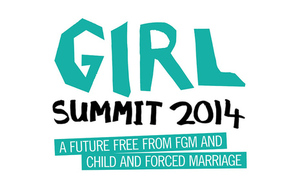New measures to tackle female genital mutilation and forced marriage announced at today’s Girl Summit
Home Secretary Theresa May opens Girl Summit.

Girl Summit logo
Prime Minister David Cameron, Home Secretary Theresa May and International Development Secretary Justine Greening have announced a new package of action and funding to protect millions of girls at home and abroad from female genital mutilation and child, early and forced marriage at today’s Girl Summit.
The Girl Summit, hosted by the government and UNICEF, is aimed at mobilising domestic and international efforts to end female genital mutilation (FGM) and child, early and forced marriage (CEFM) within a generation. It brings together domestic and international work to accelerate the work of campaigners, governments and charities around the world to bring an end to these practices.
Home Secretary Theresa May gave a speech to launch the Girl Summit this morning.
Major steps to stamp out these practices announced today include:
- A £1.4m FGM Prevention Programme, launched in partnership with NHS England to help care for survivors and safeguard those at risk;
- New police guidance from the College of Policing and an inspection programme by Her Majesty’s Inspectorate of Constabulary (HMIC) that will look at how the police handle cases of FGM
- A consultation on proposals to introduce new civil orders designed to protect girls identified as being at risk of FGM
- New legislation that will mean parents can be prosecuted if they fail to prevent their daughter being cut
- New legislation to grant victims of FGM lifelong anonymity from the time an allegation is made
- A new specialist FGM service which will include social services, to proactively identify and respond to FGM. This will be supported by an ongoing package of work led by the Chief Social Worker Isabelle Trowler.
- New programmes to prevent child, early and forced marriage in 12 developing countries
- An International Charter — calling for the eradication of these practices within a generation
Prime Minister David Cameron said:
All girls have the right to live free from violence and coercion, without being forced into marriage or the lifelong physical and psychological effects of female genital mutilation. Abhorrent practices like these, no matter how deeply rooted in societies, violate the rights of girls and women across the world, including here in the UK.
I want to build a better future for all our girls and I am hosting the Girl Summit today so that we say with one voice — let’s end these practices once and for all.
A new report out from City University London in collaboration with Equality Now estimates that approximately 60,000 girls aged 0-14 were born in England and Wales to mothers who had undergone FGM. It estimates that approximately 103,000 women aged 15-49 and approximately 24,000 women aged 50 and over, who have migrated to England and Wales, are living with the consequences of FGM. In addition, approximately 10,000 girls aged under 15 who have migrated to England and Wales, are likely to have undergone FGM.
Home Secretary Theresa May said:
FGM and forced marriage are incredibly harmful practices, and it is terrible to think about the number of women and girls in the UK who have been subjected to these crimes.
Today’s summit aims to inspire and secure a better future for thousands of women and girls who are at risk of being seriously harmed by those closest to them — either by having their sexual, physical and mental health damaged by FGM or having their education, freedom and ambition curtailed when they are coerced into an unwanted marriage.
I am proud of the action we are taking in the UK to stamp out these harmful practices and delighted to be joined by community leaders, frontline professionals and charity partners from across the world in taking further action to end FGM and forced marriage.
The event is being attended by over 500 delegates from 50 countries, UN agencies, survivors, charities, community groups, faith leaders and front line professionals, to galvanise global efforts to end FGM and CEFM within a generation.
The summit aims to secure new commitments from the private sector, faith leaders, other civil society organisations and governments.
Attendees will hear from girls and women who have lived through FGM or CEFM, and from inspiring individuals who are now campaigning for change so that others can enjoy greater opportunities in the future.
Sign the pledge to end FGM and CEFM and visit for more details about the summit.